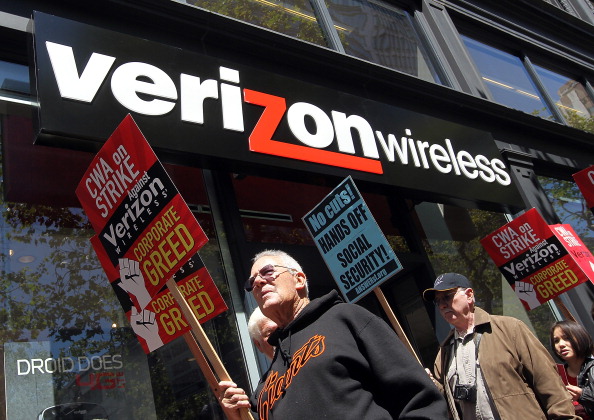36,000 Verizon employees are now on strike. This is what it could mean for you.


A free daily email with the biggest news stories of the day – and the best features from TheWeek.com
You are now subscribed
Your newsletter sign-up was successful
More than 36,000 Verizon workers walked off the job Wednesday morning after two labor unions failed to reach a new agreement by their 6 a.m. deadline with the company, The New York Times reports. The employees' contracts have now been expired for more than eight months.
Over 99 percent of the striking employees are involved in Verizon's wireline business, which includes its landline phone service but also the fiber optic network that provides internet, phone, and video. While Verizon has said customers will be unaffected by the strike, wireline consumers could actually see a drop in the quality of their service as only 10,000 nonunion employees are stepping in to replace the 36,000 strikers. The nonunion employees taking over the wireline service only have a year of training.
"Training and doing are very different things. You can be as well trained as anybody, but it doesn't mean you can go in the field and fix anything," Rutgers professor and telecom expert Jeffrey Keefe pointed out to The New York Times.
The Week
Escape your echo chamber. Get the facts behind the news, plus analysis from multiple perspectives.

Sign up for The Week's Free Newsletters
From our morning news briefing to a weekly Good News Newsletter, get the best of The Week delivered directly to your inbox.
From our morning news briefing to a weekly Good News Newsletter, get the best of The Week delivered directly to your inbox.
An independent technology analyst for Jackdaw Research, Jan Dawson, agreed. "There will almost certainly be some functions which may be slower or unavailable during the strike, because they require specialized skills or there just aren't sufficient alternative resources available to fill all functions," he said.
However, wireless customers' complaints are what might truly sway the company, as the service has overtaken the wireline business. Luckily for the unions, because a select few of the striking employees are Verizon Wireless workers, the group will be able to heavily picket stores.
Verizon workers have not specified the length of their strike, which could go on for days, weeks, or months. The unions are reacting against proposed pension benefit cuts as well as changes that would make it easier to outsource work.
A free daily email with the biggest news stories of the day – and the best features from TheWeek.com
Jeva Lange was the executive editor at TheWeek.com. She formerly served as The Week's deputy editor and culture critic. She is also a contributor to Screen Slate, and her writing has appeared in The New York Daily News, The Awl, Vice, and Gothamist, among other publications. Jeva lives in New York City. Follow her on Twitter.
-
 The 8 best TV shows of the 1960s
The 8 best TV shows of the 1960sThe standout shows of this decade take viewers from outer space to the Wild West
-
 Microdramas are booming
Microdramas are boomingUnder the radar Scroll to watch a whole movie
-
 The Olympic timekeepers keeping the Games on track
The Olympic timekeepers keeping the Games on trackUnder the Radar Swiss watchmaking giant Omega has been at the finish line of every Olympic Games for nearly 100 years
-
 TikTok secures deal to remain in US
TikTok secures deal to remain in USSpeed Read ByteDance will form a US version of the popular video-sharing platform
-
 Unemployment rate ticks up amid fall job losses
Unemployment rate ticks up amid fall job lossesSpeed Read Data released by the Commerce Department indicates ‘one of the weakest American labor markets in years’
-
 US mints final penny after 232-year run
US mints final penny after 232-year runSpeed Read Production of the one-cent coin has ended
-
 Warner Bros. explores sale amid Paramount bids
Warner Bros. explores sale amid Paramount bidsSpeed Read The media giant, home to HBO and DC Studios, has received interest from multiple buying parties
-
 Gold tops $4K per ounce, signaling financial unease
Gold tops $4K per ounce, signaling financial uneaseSpeed Read Investors are worried about President Donald Trump’s trade war
-
 Electronic Arts to go private in record $55B deal
Electronic Arts to go private in record $55B dealspeed read The video game giant is behind ‘The Sims’ and ‘Madden NFL’
-
 New York court tosses Trump's $500M fraud fine
New York court tosses Trump's $500M fraud fineSpeed Read A divided appeals court threw out a hefty penalty against President Trump for fraudulently inflating his wealth
-
 Trump said to seek government stake in Intel
Trump said to seek government stake in IntelSpeed Read The president and Intel CEO Lip-Bu Tan reportedly discussed the proposal at a recent meeting
